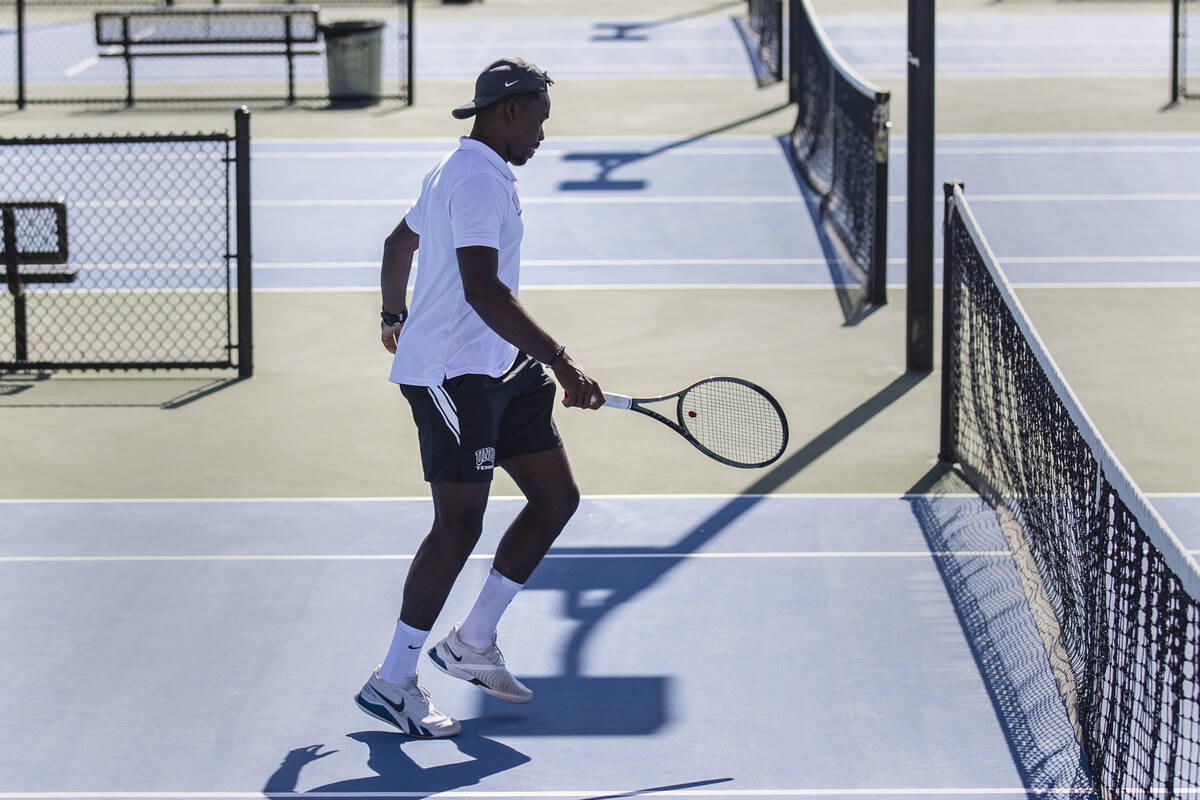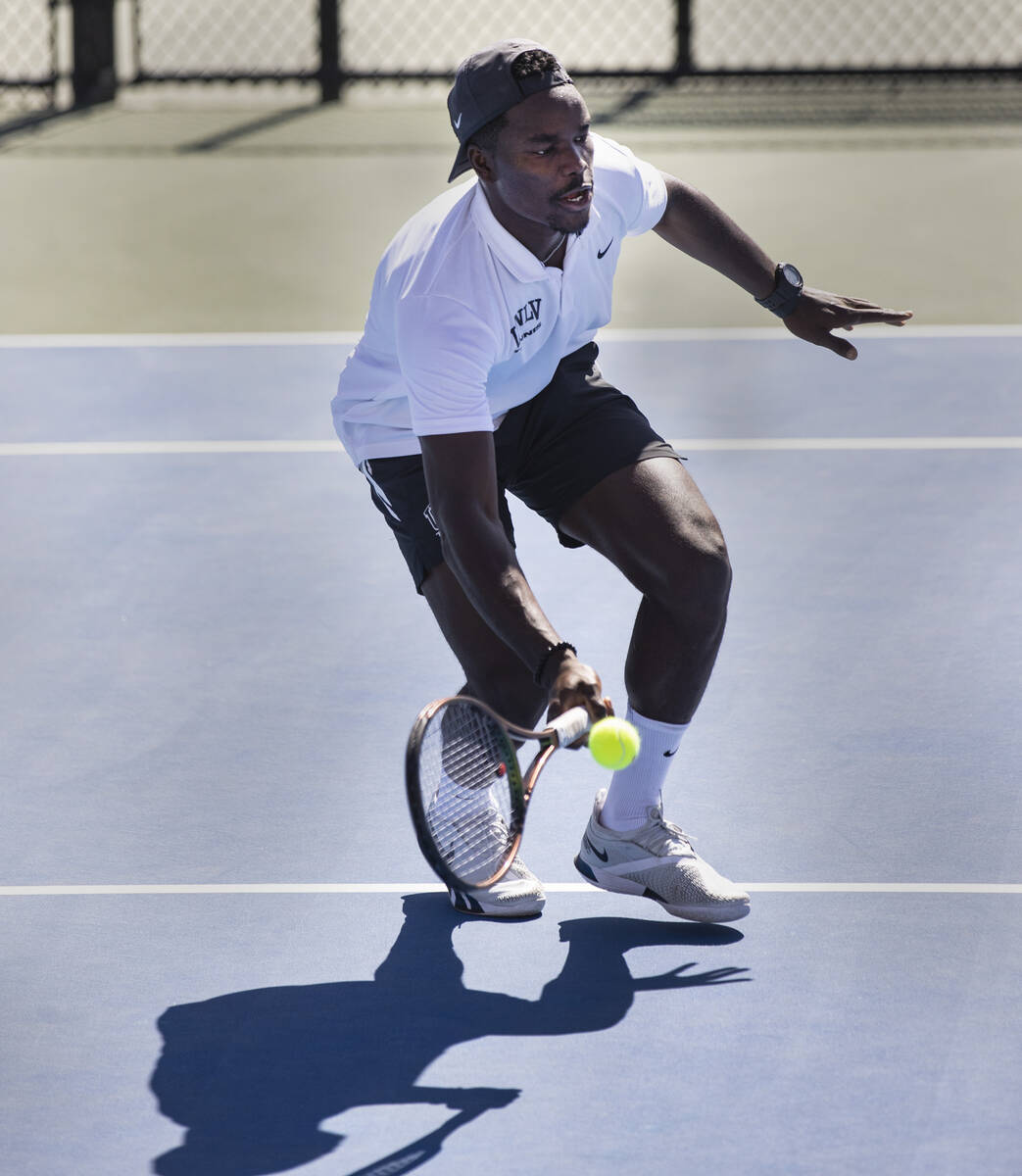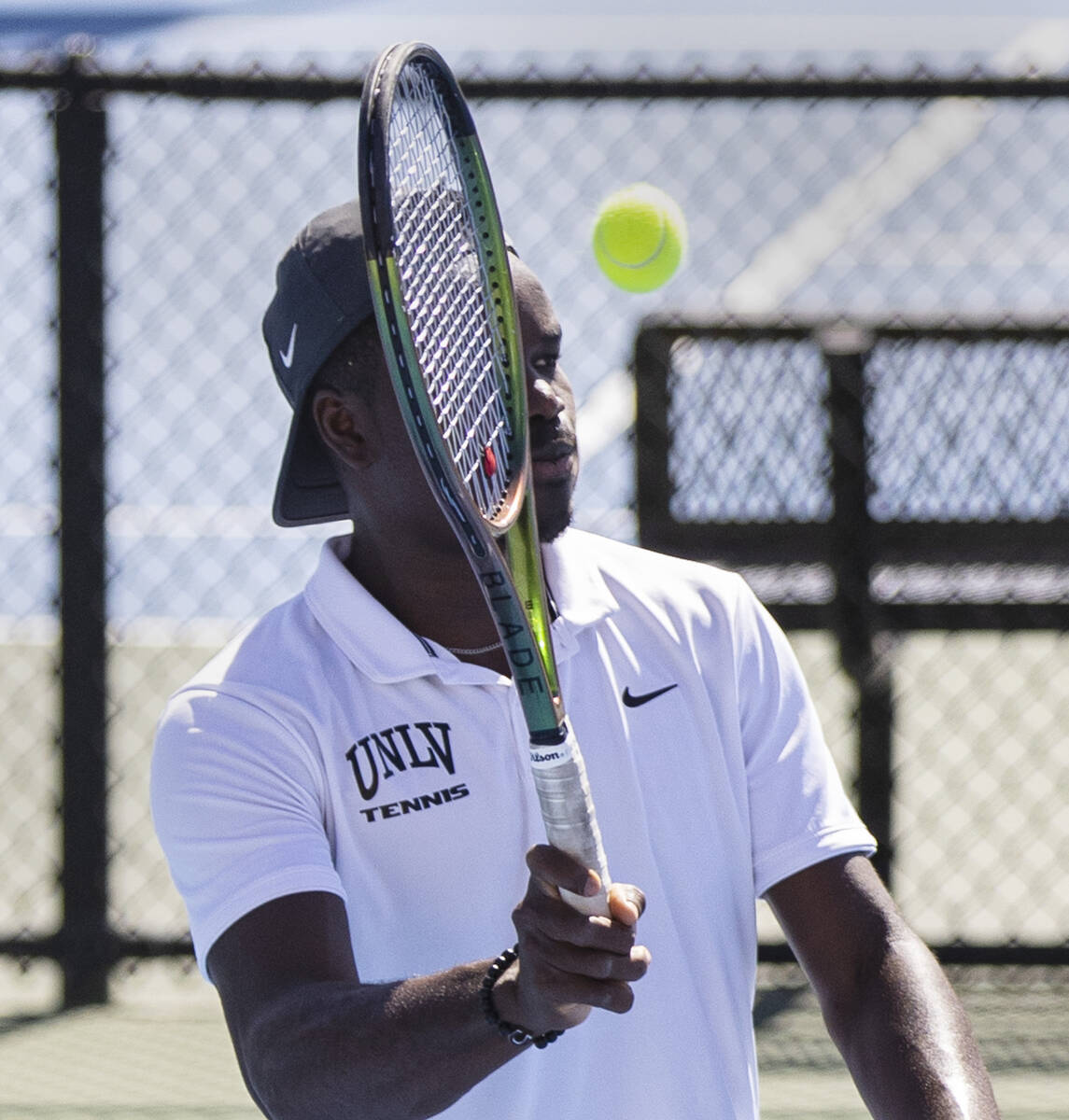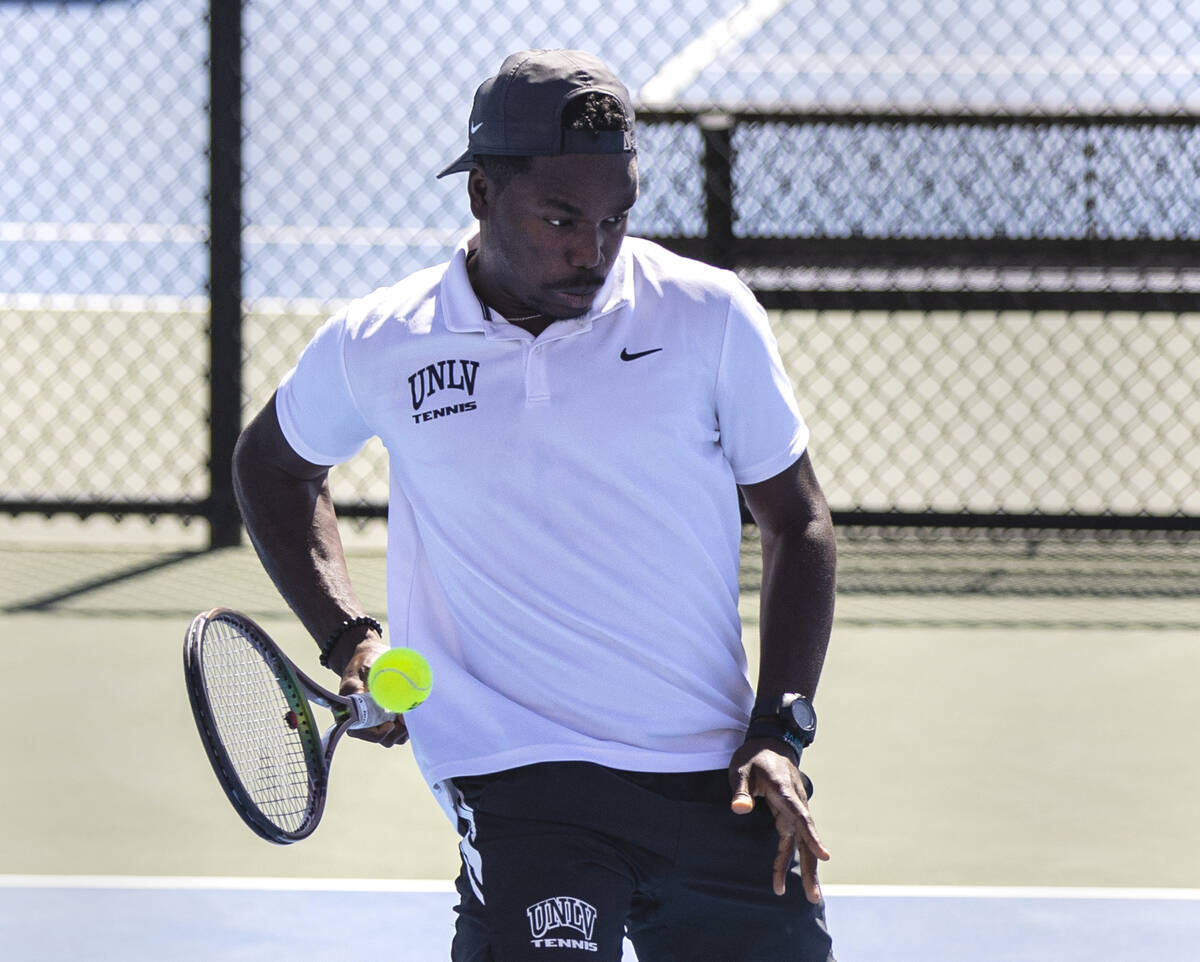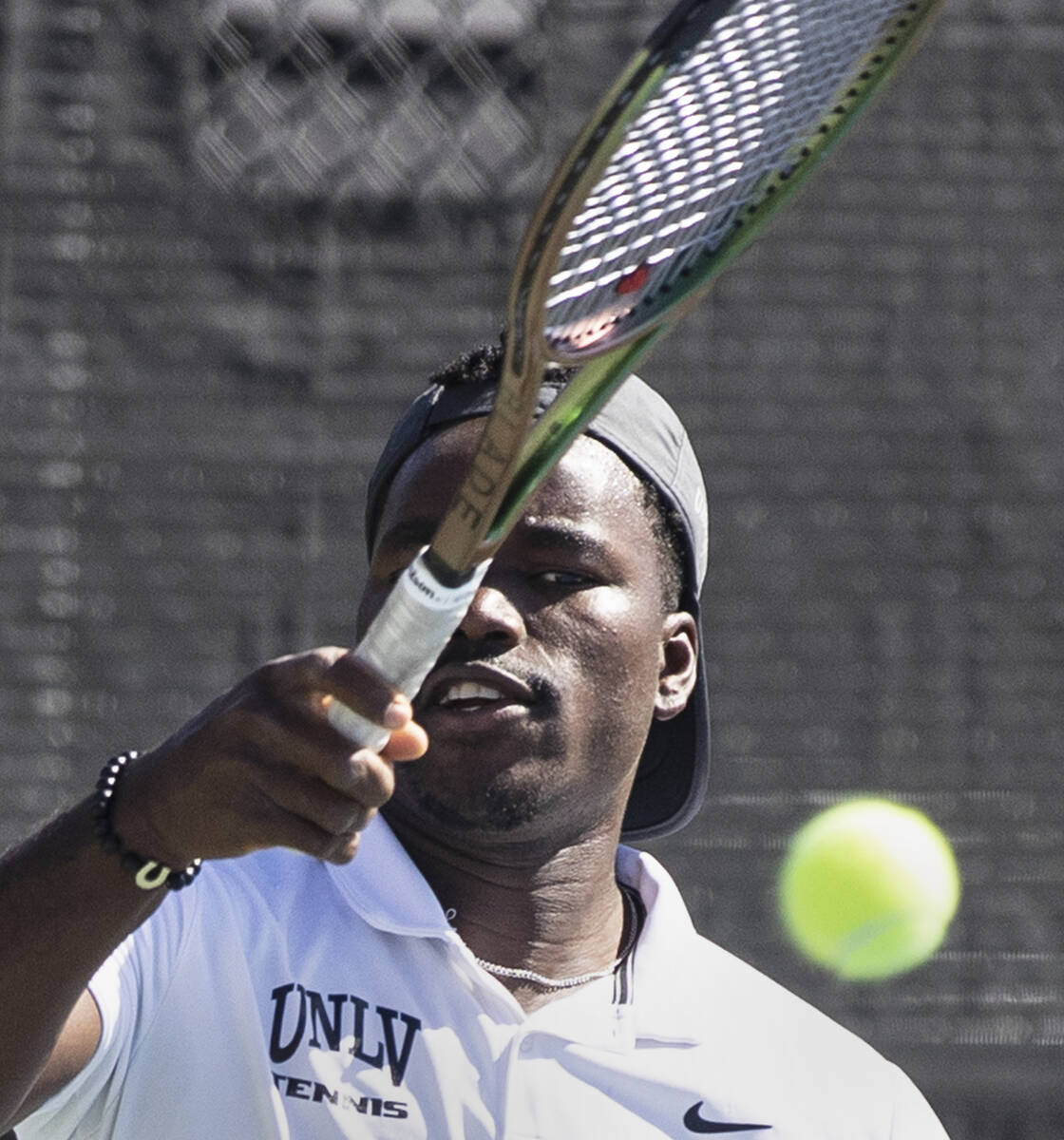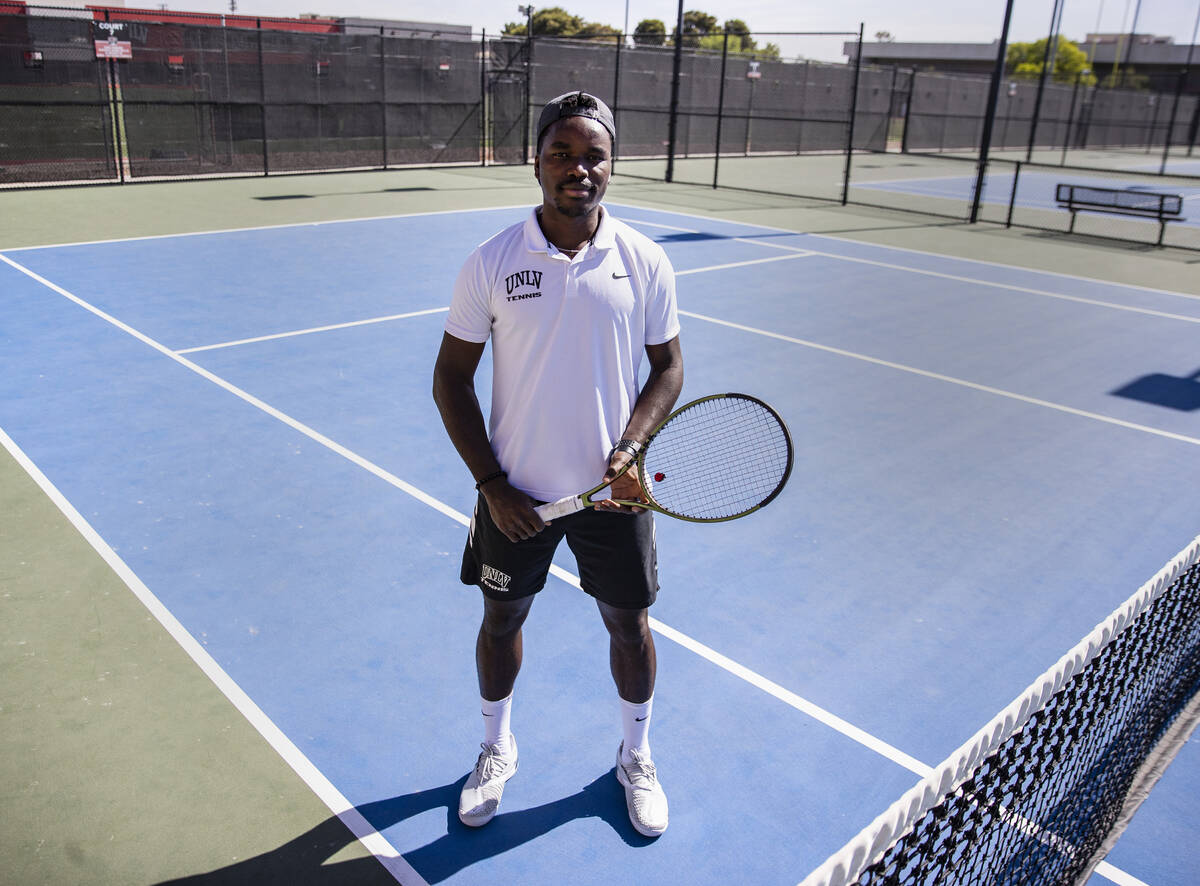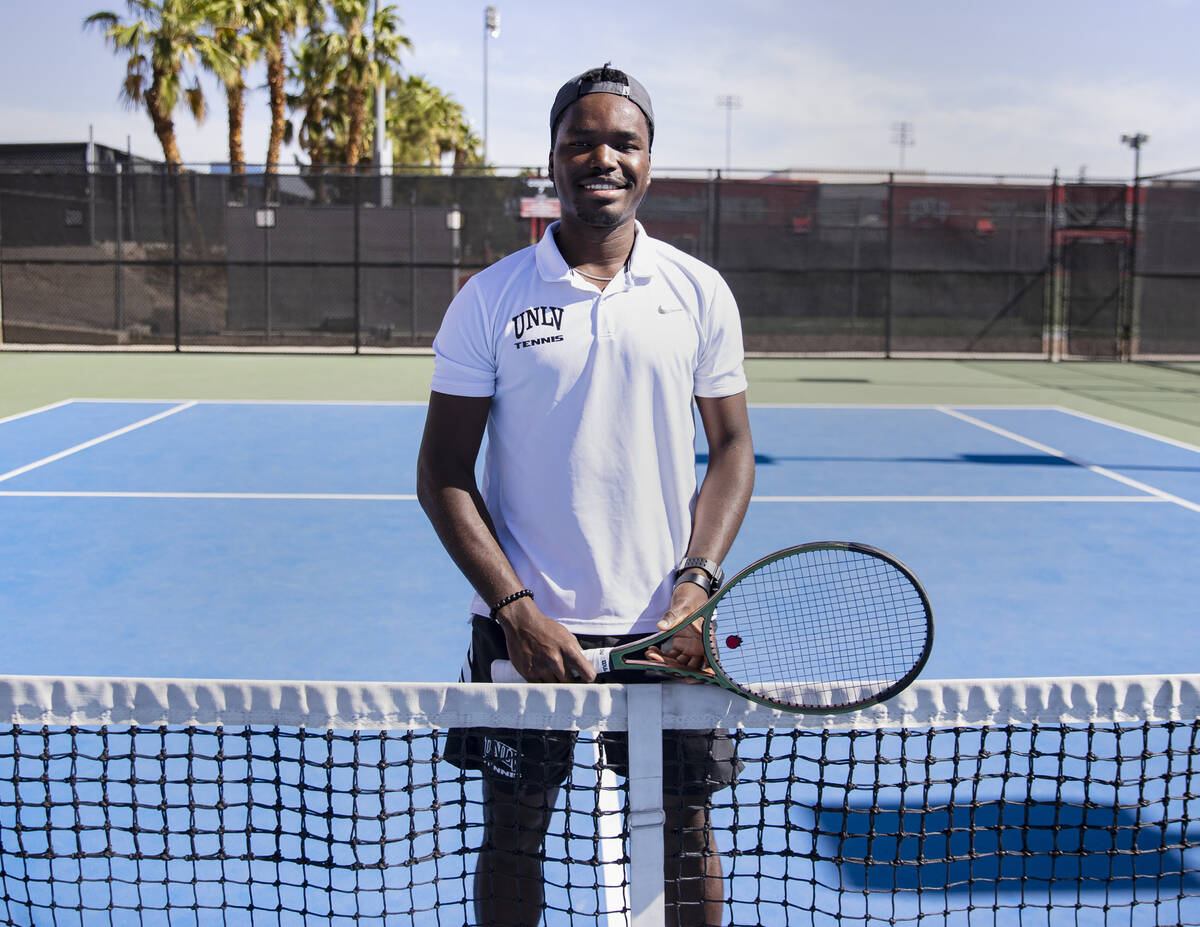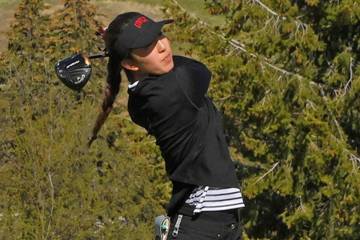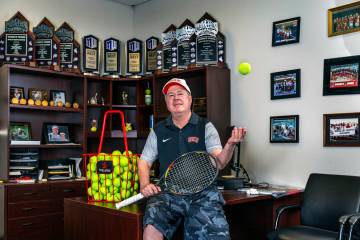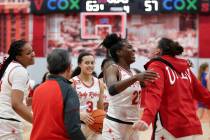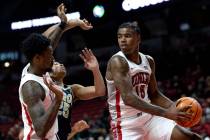Christopher Bulus’ incredible journey from Nigeria to UNLV
The commute was grueling, covering four countries in 48 hours. All by bus, because Christopher Bulus couldn’t afford to fly from his native Nigeria to the annual ITF junior D’Abidjan tennis tournament in Ivory Coast. He’d sleep two or three hours in between rides. Talk to coach Abel Ubiebi to pass the time.
Sometimes he’d eat. Sometimes he’d famish. What Bulus wouldn’t do is quit.
He probably could have when he was orphaned in 2016 after his mother’s death. Or a year later, when workers at an Ivory Coast hotel mistook him for a refugee and denied him access to the room he traveled two days to stay in.
But then he wouldn’t be one of the greatest tennis players in Nigerian history — or UNLV history, either.
Bulus is perseverance personified, packaged in a lean but muscular 6-foot, 1-inch frame. Armed with a wicked backhand, soft drop shot and a contagious, radiant smile, the senior transfer will conclude an improbable collegiate career this week as the Mountain West Player of the Year and 12th player in program history to play in the NCAA Singles Championship, which begins Monday in Champaign, Illinois.
He plays at 11:30 a.m. against Arizona’s Jonas Zivers, whom he beat Feb. 19 in Tuscon, Arizona.
Bulus’ lone year at UNLV follows stints at West Alabama and New Mexico Military Institute, where he sharpened the talent and mettle he first developed as a resourceful ball boy in his beloved hometown of Lagos.
“Chris back home is a role model,” Ubiebi said. “The kids back home, they believe if he can do it, they can do it.”
Honing his craft
Perhaps the 21-year-old privately grieves the deaths of his parents, his dad in 2008 and his mom eight years later. But he’s a pillar of strength in public, renowned at every collegiate stop for his jovial nature, work ethic, leadership and loyalty.
He’s the youngest of five kids, raised 15 minutes outside the city center in a modest Christian home that fostered the selfless values he strives to live by.
A silver cross dangles from a thin chain around his neck, and he rarely removes it, preferring to wear it when he plays tennis.
Bulus was actually a recreational gymnast first who would playfully tumble outside with his friends. But only after torrential downpour softened the dirt fields in his neighborhood, creating natural cushioning that mitigated the impact.
Those same friends developed an interest in tennis by working at Lagos Lawn Tennis Club, Nigeria’s oldest club. And he also began as an 11-year-old ball boy during a six-week summer camp — drawing inspiration from the professional players who would compete in the annual Governor’s Cup Lagos Tennis Championship.
“We’d see them play, and it’s like ‘Wow, there are so many rackets.’ And then you’d see on the rackets, they’re customized with their names,” said Bulus, who would play with whatever equipment was available.
“At that point, you just wanted to keep playing,” he added. “I just loved it, you know?”
So Bulus would play and play and play, walking every day to the club to hit with members who needed a partner. The newfound routine extended beyond the summer and into the academic year, during which he’d go straight from school to the club to practice for hours alongside other tennis enthusiasts.
He’d train without formal instruction until 2015, when he was introduced to Ubiebi by a mutual associate. Ubiebi, long regarded as one of Nigeria’s premier instructors, trained Bulus for free.
“He never got satisfied with his performance,” said Ubiebi, who came this month to Las Vegas to watch Bulus graduate with a degree in economics. “He’d keep asking for more. … He never believed he was good.”
With Ubiebi’s backing, Bulus began playing in local and regional amateur tournaments. The death of his mother fostered additional drive in Bulus, who honors her memory through the spirit of competition.
He’d improve with each tournament, advancing deeper and deeper to face better and better players. He reached the tournament championship in the Ivory Coast despite displacement from his hotel, sharing a one-bed unit at another with four others instead while consuming only bread and water throughout the course of the event.
“Nobody expected him to get to the final,” Ubiebi said.
Bulus would climb the Nigerian national rankings, reaching No. 6 — and prompting speculation at Ubiebi’s behest about the prospects of a career abroad. He connected Bulus with Dan O’Connell, a former Peace Corps tennis coach and International Tennis Federation employee who taught the sport in Africa for 15 years.
O’Connell, then the tennis coach at New Mexico Military Institute, had built a program comprised of international students who shared his passion for tennis. He worked to aggregate the requisite financial aid for Bulus, who left Nigeria in January 2018 for New Mexico after acquiring documentation.
He hasn’t returned in four years, but maintains regular contact with his siblings from afar.
“He’s a special kid,” O’Connell said. “Special, special young man.”
A new beginning
New rackets. New strings. New balls. New shoes. All new experiences for Bulus when he arrived in New Mexico. Never before did he have access to a preponderance of resources.
And that was at a junior college in Roswell.
The school’s militaristic nature provided structure for Bulus, who awoke Monday through Friday at 6 a.m and attended class until 3:30 p.m. He’d practice with the team afterward and rest when he could, acknowledging the fatigue that accompanied the arduous schedule.
Yet Bulus never complained and compiled a 31-9 record in two seasons while galvanizing the program with his leadership. He’s a stoic competitor who rarely shows emotion during matches. But his cheerful demeanor helped bond his teammates.
“He just took everything in,” said O’Connell, for whom Bulus once cooked a traditional Nigerian dinner as a token of his gratitude.
“Just a pleasure to be around, and he worked hard and got better,”
O’Connell referred Bulus to friend and West Alabama coach Jeff Beaman, who ensured Bulus would have the financial aid to comfortably attend the Division II school in Livingston, Alabama. With that in mind, Bulus transferred in 2019 and intensified his training — sans the rigorous schedule to which he conformed at New Mexico Military Institute.
He thrived in doubles play during his first year with the Tigers and spent the ensuing summer living with a host family and training middle and high school players in the greater Dallas area, where one of Beaman’s former players coaches.
He played tournaments in Texas and developed a sonly bond with former club basketball coach Benny Price, whose daughter trained that summer under Bulus. In Price, Bulus found a mentor independent of tennis who emboldened his ambitions and encouraged his growth.
“You’ve got the talent, but you’re too humble,” Price would tell him. “You’ve got another gear,” he’d reaffirm, and Bulus believed him.
He beat multiple Division I players in tournaments that summer and posted a 14-2 record last season as West Alabama’s No. 1 singles player en route to the No. 4 ranking at the Division II level, triggering a trip to the transfer portal.
Along with UNLV, Louisiana State, Brigham Young, Texas-San Antonio and North Carolina-Wilmington recruited Bulus. He still can’t pinpoint exactly why he signed with the Rebels, but noted that a diverse roster comprised of players from around the world helped influence his decision.
He signed his national letter of intent last May, lived with Price last summer and trained in Texas. He beat more Power Five players in tournaments to build additional confidence before moving last fall to Las Vegas.
“The first thing that stood out to everybody is he’s the hardest working guy out there,” said UNLV junior Zach Garner, Bulus’ doubles partner. “All the matches he wins, it’s very well deserved. … He’s prepared for everything.”
Bulus began winning the second he stepped on campus — capturing the annual Larry Easley Memorial Classic at Fertitta Tennis Complex without dropping a set.
Rebels coach Owen Hambrook figured then that Bulus would be UNLV’s top singles player, and he was right. He tallied a 21-6 record against the best players from opposing programs and clinched the Mountain West’s automatic berth to the NCAA singles tournament.
“There’s so much at stake,” Bulus said. “I’ve still got to get on the grind.”
Bulus’ tenure at UNLV might end this week, but, as he says, the grind doesn’t. He intends to move to New York this year to pursue a professional career.
He also hopes to work with and promote the Nigerian tennis players he inspires.
He sports a black wristband on his left hand, a gift from one of the host families that still supports him from afar. “If you believe, you will achieve,” it reads in white.
A tennis racket sits beside the lettering.
“Tennis has given him a means to improve. To change his life. And he’s making the most of it,” Hambrook said. “It makes it worthwhile for me to see a kid like that do well. … He deserves everything he gets.”
Contact Sam Gordon at sgordon@reviewjournal.com. Follow @BySamGordon on Twitter.
The Bulus file
Age: 21
Year: Senior
Hometown: Lagos, Nigeria
Record: 21-6 and ranked No. 101 in the nation.
Awards: Mountain West Player of the Year.
Next up: Plays 52nd-ranked Jonas Ziverts of Arizona on Monday in the NCAA Singles Championship at the University of Illinois.
Did you know: Bulus is the 12th player in UNLV tennis history to play in the NCAA Singles Championship.



